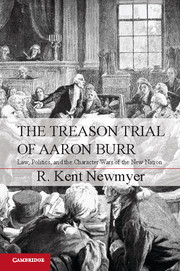Book contents
- Frontmatter
- Contents
- Acknowledgments
- Introduction
- Chronology of the Conspiracy and Associated Trial Proceedings
- Prologue A Mind-Jostling Trial
- 1 Jefferson and Burr on the Road to Richmond
- 2 Jefferson and Marshall Square Off
- 3 Legal Theater in Richmond
- 4 Treason Law for America
- 5 Judging the Judge
- Epilogue
- Index
- References
1 - Jefferson and Burr on the Road to Richmond
Published online by Cambridge University Press: 05 October 2012
- Frontmatter
- Contents
- Acknowledgments
- Introduction
- Chronology of the Conspiracy and Associated Trial Proceedings
- Prologue A Mind-Jostling Trial
- 1 Jefferson and Burr on the Road to Richmond
- 2 Jefferson and Marshall Square Off
- 3 Legal Theater in Richmond
- 4 Treason Law for America
- 5 Judging the Judge
- Epilogue
- Index
- References
Summary
“I never indeed thought him an honest, frank-dealing man, but considered him as a crooked gun, or other perverted machine, whose aim or shot you could never be sure of.”
Jefferson on Burr“Although I never thought so highly of his natural Talents or his acquired attainments, as many of both Parties have represented them, I never believed him to be a Fool. But he must be a Idiot or a Lunatick if he has really planned and Attempted to execute such a Project as is imputed to him.”
John Adams on Burr“… Mr. Jefferson has been too hasty in his Message in which he has denounced him [Burr] by Name and pronounced him guilty. But if his guilt is as clear as the Noon day sun, the first Magistrate ought not to have pronounced it so before a Jury had tryed him.”
John Adams on Jefferson on BurrHistorians looking to illustrate the way judicial lawmaking in the new nation was influenced by chance and contingency, human passions, follies and character quirks might well turn to the treason trial of Aaron Burr. To make the point the story should begin with Aaron Burr and Thomas Jefferson, because it was their mutual feelings of distrust and contempt and their intersecting political aspirations that set the trial in motion and set loose the political passions that influenced the proceedings.
The relationship between Jefferson and Burr began in the late 1790s, when both men were interested for their own reasons in driving the Federalist party of Washington and Adams from office. Whether Jefferson and Madison talked serious politics with Burr in 1791 on their famed botanical trip to New York is not clear. What became clear in the course of the decade, however, was that Burr proved himself to be the man most capable of delivering New York’s electoral votes in the upcoming presidential election of 1800. For his pivotal role in forging the New York–Virginia political axis, Burr won a place on the ballot with Jefferson. When New York’s electoral votes carried the Democratic Republican party to victory, Burr deserved a real share of the credit.
- Type
- Chapter
- Information
- The Treason Trial of Aaron BurrLaw, Politics, and the Character Wars of the New Nation, pp. 19 - 45Publisher: Cambridge University PressPrint publication year: 2012

